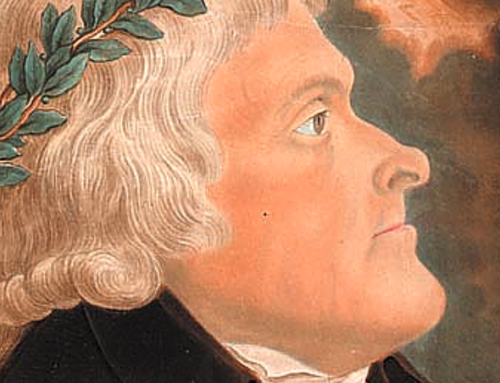Our friends at ISI have made all of their books available at a 40% discount for this holiday season. All The Imaginative Conservative readers should got to their online bookstore and add these books to your library. Introduce your family and friends to the ideas of Russell Kirk and other conservative thinkers by purchasing extra books to give away as gifts.
Here is a list of books that The Imaginative Conservative recommends with short descriptions from the ISI store:
 The Roots of American Order by Russell Kirk
The Roots of American Order by Russell Kirk
What holds America together? In this classic work, Russell Kirk describes the beliefs and institutions that have nurtured the American soul and commonwealth. Beginning with the Hebrew prophets, Kirk examines in dramatic fashion the sources of American order. His analytical narrative might be called “a tale of five cities”: Jerusalem, Athens, Rome, London, and Philadelphia. For an understanding of the significance of America at the dawn of a new century, Russell Kirk’s masterpiece on the history of American civilization is unsurpassable. This edition includes a new foreword by the distinguished historian Forrest McDonald. (A must have book and only $10.80 from ISI. See review on The Imaginative Conservative.)
 The Sword of Imagination: Memoirs of a Half-Century of Literary Conflict by Russell Kirk
The Sword of Imagination: Memoirs of a Half-Century of Literary Conflict by Russell Kirk
Russell Kirk (1918-1994) was an active participant in the intellectual, social, and political contests in our era. This memoir, written dispassionately in the third person, is a lively account of the literary and political controversies of more than half a century. These chapters discuss the climate of opinion, the tribulations, and the prospects of modern culture….This book is as much a chronicle of the confusion and perplexities of the twentieth century as it is an autobiography. Philosophical insights and religious observations abound. (Buy a hardback for ONLY $3.75, buy 5 and give them away!)
 American Cicero: The Life of Charles Carroll by Bradley J. Birzer
American Cicero: The Life of Charles Carroll by Bradley J. Birzer
Before his death in 1832, Charles Carroll of Carrollton—the last living signer of the Declaration of Independence—was widely regarded as one of the most important Founders. Today, Carroll’s signal contributions to the American Founding are overlooked, but the fascinating biography American Cicero rescues Carroll from unjust neglect. Drawing on his considerable study of Carroll’s published and unpublished writings, historian Bradley J. Birzer masterfully captures a man of supreme intellect, imagination, integrity, and accomplishment.(Fantastic book by The Imaginative Conservative’s Senior Editor. See brief The Imaginative Conservative review.)
 Eliot and His Age: T.S. Eliot’s Moral Imagination in the Twentieth Century by Russell Kirk
Eliot and His Age: T.S. Eliot’s Moral Imagination in the Twentieth Century by Russell Kirk
Though much has been written about T. S. Eliot since it was first published, Eliot and His Age remains the best introduction to the poet’s life, ideas, and literary works. It is the essential starting place for anyone who would understand what Eliot was about. Russell Kirk’s view of his older friend is sympathetic but not adulatory. His insights into Eliot’s writings are informed by wide reading in the same authors who most influenced the poet, as well as by similar experiences and convictions. (Wonderful book with a beautiful introduction by The Imaginative Conservative contributor Ben Lockerd.)
Redeeming the Time by Russell Kirk
Here, Kirk counsels the reader to direct his energies toward cultural renewal. Distilled in these pages are many of the central tenets of Kirk’s brand of humane conservatism. (See review on The Imaginative Conservative.)
 Edmund Burke: A Genius Reconsidered by Russell Kirk
Edmund Burke: A Genius Reconsidered by Russell Kirk
In this, the liveliest and most accessible one-volume life of Edmund Burke, Russell Kirk ingeniously combines into a living whole the private and the public Burke. He gives us a fresh assessment of the great statesman, who enjoys even greater influence today than in his own time. Russell Kirk was a leading figure in the post-World War II revival of American interest in Edmund Burke. Today, no one who takes seriously the problems of society dares remain indifferent to “the first conservative of our time of troubles.” (Read this book! See review on The Imaginative Conservative.)

The American Cause by Russell Kirk
The American Cause explains in simple yet eloquent language the bedrock principles upon which America’s experiment in constitutional self-government is built. Russell Kirk, whose life and thought has been featured in C-SPAN’s acclaimed “American Writers” series, intended “this little book” to be an assertion of the moral and social principles upholding our nation. Kirk’s primer is an aid to reflection on those principles—political, economic, and religious—that have united Americans when faced with challenges and threats from the enemies of ordered freedom.
 Freedom and Virtue: The Conservative/ Libertarian Debate edited by George W. Carey
Freedom and Virtue: The Conservative/ Libertarian Debate edited by George W. Carey
Ideas about the nature of liberty and a normative moral tradition lie at the heart of many contemporary political controversies. Because they are concerned with core principles, these debates can be vigorous and highly charged. Nowhere has this been more evident in our time than in the lively exchanges between conservatives and libertarians. Like no other single work, Freedom and Virtue explores what unites and divides the adherents of these two important American traditions—shedding much light on our current political landscape.
 American Conservatism: An Encyclopedia edited by Bruce Frohnen, Jeremy Beer, and Jeffrey O. Nelson
American Conservatism: An Encyclopedia edited by Bruce Frohnen, Jeremy Beer, and Jeffrey O. Nelson
American Conservatism: An Encyclopedia is the first comprehensive reference volume to cover what is surely the most influential political and intellectual movement of the last half century. More than fifteen years in the making—and more than half a million words in length—this informative and entertaining encyclopedia contains substantive entries of up to two thousand words on those persons, events, organizations, and concepts of major importance to postwar American conservatism.
 Arguing Conservatism: Four Decades of the Intercollegiate Review edited by Mark C. Henrie
Arguing Conservatism: Four Decades of the Intercollegiate Review edited by Mark C. Henrie
With a circulation in the tens of thousands, and featuring foundational essays ranging across the disciplines—from political theory, philosophy, and economics to strategic studies, cultural criticism, and belles lettres—the Intercollegiate Review has been since 1965 one of the central organs of American conservative intellectual life. Many of the most serious thinkers on the right have appeared in the IR, and some of the most important theoretical debates in American conservatism have played out in its pages. At once sophisticated, penetrating, profound, and humane, the IR has consistently reflected the American conservative mind at its most thoughtful.
Russell Kirk: A Critical Biography of a Conservative Mind by James E. Person, Jr.
When people look to the founding of the modern conservative movement, they must ultimately look to Russell Kirk (1918–1994). Author of the groundbreaking treatise The Conservative Mind, Kirk defined conservative political thought for the post-World War II era. An imaginative and optimistic thinker, Kirk wrote essays on justice, society, education, economics, history, and literature that are timeless reminders of what Kirk called “the permanent things.”
Russell Kirk: A Bibliography
In the four decades after Russell Kirk published the landmark work The Conservative Mind (1953), the social philosopher, critic, and historian of ideas produced an incredible abundance of writings—books, essays, articles, columns, reviews, and fiction—and lectured all over the world. This volume provides a complete accounting of Kirk’s oeuvre, capturing the breadth and depth of his achievement.
 The Great Tradition: Classical Readings on What it Means to Be an Educated Human Being edited by Richard M. Gamble
The Great Tradition: Classical Readings on What it Means to Be an Educated Human Being edited by Richard M. Gamble
Frustrated with the continuing educational crisis of our time, concerned parents, teachers, and students sense that true reform requires more than innovative classroom technology, standardized tests, or skills training. An older tradition—the Great Tradition—of education in the West is waiting to be heard. Since antiquity, the Great Tradition has defined education first and foremost as the hard work of rightly ordering the human soul, helping it to love what it ought to love, and helping it to know itself and its maker. In the classical and Christian tradition, the formation of the soul in wisdom, virtue, and eloquence took precedence over all else, including instrumental training aimed at the inculcation of “useful” knowledge. (See The Imaginative Conservative review.)
Books on the topic of this essay may be found in The Imaginative Conservative Bookstore. The Imaginative Conservative applies the principle of appreciation to the discussion of culture and politics—we approach dialogue with magnanimity rather than with mere civility. Will you help us remain a refreshing oasis in the increasingly contentious arena of modern discourse? Please consider donating now.








I'd have to also thrown in a plug for the fine collection on John Lukacs as well.